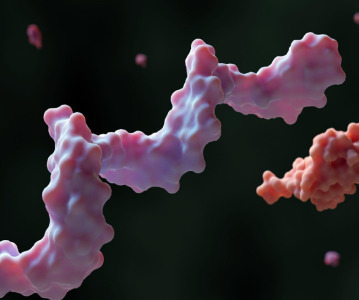Designer compound may untangle damage leading to some dementias

NIH-funded preclinical study suggests a possible treatment for Alzheimer’s disease and other neurodegenerative disorders.
In a study of mice and monkeys, National Institutes of Health funded researchers showed that they could prevent and reverse some of the brain injury caused by the toxic form of a protein called tau. The results, published in Science Translational Medicine, suggest that the study of compounds, called tau antisense oligonucleotides, that are genetically engineered to block a cell’s assembly line production of tau, might be pursued as an effective treatment for a variety of disorders.
Cells throughout the body normally manufacture tau proteins. In several disorders, toxic forms of tau clump together inside dying brain cells and form neurofibrillary tangles, including Alzheimer’s disease, tau-associated frontotemporal dementia, chronic traumatic encephalopathy and progressive supranuclear palsy. Currently there are no effective treatments for combating toxic tau.
"This compound may literally help untangle the brain damage caused by tau,” said Timothy Miller, the David Clayson Professor of Neurology at Washington University, St. Louis, and the study's senior author.
Antisense oligonucleotides are short sequences of DNA or RNA programmed to turn genes on or off. Led by Sarah L. DeVos, a graduate student in Dr Miller’s lab, the researchers tested sequences designed to turn tau genes off in mice that are genetically engineered to produce abnormally high levels of a mutant form of the human protein. Tau clusters begin to appear in the brains of 6-month-old mice and accumulate with age. The mice develop neurologic problems and die earlier than control mice.
Injections of the compound into the fluid filled spaces of the mice brains prevented tau clustering in 6-9 month old mice and appeared to reverse clustering in older mice. The compound also caused older mice to live longer and have healthier brains than mice that received a placebo. In addition, the compound prevented the older mice from losing their ability to build nests.
“These results open a promising new door,” said Margaret Sutherland, program director at NIH’s National Institute of Neurological Disorders and Stroke. “They suggest that antisense oligonucleotides may be effective tools for tackling tau-associated disorders.”
Currently researchers are conducting early-phase clinical trials on the safety and effectiveness of antisense oligonucleotides designed to treat several neurological disorders, including Huntington’s disease and amyotrophic lateral sclerosis. The FDA recently approved the use of an antisense oligonucleotide for the treatment of spinal muscular atrophy, a hereditary disorder that weakens the muscles of infants and children.
Further experiments on non-human primates suggested that the antisense oligonucleotides tested in mice could reach important areas of larger brains and turn off tau. In comparison with placebo, two spinal tap injections of the compound appeared to reduce tau protein levels in the brains and spinal cords of Cynomologus monkeys. As the researchers saw with the mice, injections of the compound caused almost no side effects.
Nevertheless, the researchers concluded that the compound needs to be fully tested for safety before it can be tried in humans. They are taking the next steps towards translating it into a possible treatment for a variety of tau related disorders.
Related News
-
News Google-backed start-up raises US$600 million to support AI drug discovery and design
London-based Isomorphic Labs, an AI-driven drug design and development start-up backed by Google’s AI research lab DeepMind, has raised US$600 million in its first external funding round by Thrive Capital. The funding will provide further power t... -
News AstraZeneca to invest US$2.5 billion in Beijing R&D centre
Amid investigations of former AstraZeneca China head Leon Wang in 2024, AstraZeneca have outlined plans to establish its sixth global strategic R&D centre in China. Their aim is to further advance life sciences in China with major research and manufact... -
News Experimental drug for managing aortic valve stenosis shows promise
The new small molecule drug ataciguat is garnering attention for its potential to manage aortic valve stenosis, which may prevent the need for surgery and significantly improve patient experience. -
News How GLP-1 agonists are reshaping drug delivery innovations
GLP-1 agonist drug products like Ozempic, Wegovy, and Mounjaro have taken the healthcare industry by storm in recent years. Originally conceived as treatment for Type 2 diabetes, the weight-loss effects of these products have taken on unprecedented int... -
News A Day in the Life of a Start-Up Founder and CEO
At CPHI we work to support Start-Up companies in the pharmaceutical industry and recognise the expertise and innovative angles they bring to the field. Through our Start-Up Programme we have gotten to know some of these leaders, and in this Day in the ... -
News Biopharmaceutical manufacturing boost part of new UK government budget
In their national budget announced by the UK Labour Party, biopharmaceutical production and manufacturing are set to receive a significant boost in capital grants through the Life Sciences Innovative Manufacturing Fund (LSIMF). -
News CPHI Podcast Series: The power of proteins in antibody drug development
In the latest episode of the CPHI Podcast Series, Lucy Chard is joined by Thomas Cornell from Abzena to discuss protein engineering for drug design and development. -
News Amgen sues Samsung biologics unit over biosimilar for bone disease
Samsung Bioepis, the biologics unit of Samsung, has been issued a lawsuit brought forth by Amgen over proposed biosimilars of Amgen’s bone drugs Prolia and Xgeva.
Recently Visited
Position your company at the heart of the global Pharma industry with a CPHI Online membership
-
Your products and solutions visible to thousands of visitors within the largest Pharma marketplace
-
Generate high-quality, engaged leads for your business, all year round
-
Promote your business as the industry’s thought-leader by hosting your reports, brochures and videos within your profile
-
Your company’s profile boosted at all participating CPHI events
-
An easy-to-use platform with a detailed dashboard showing your leads and performance







.png)




